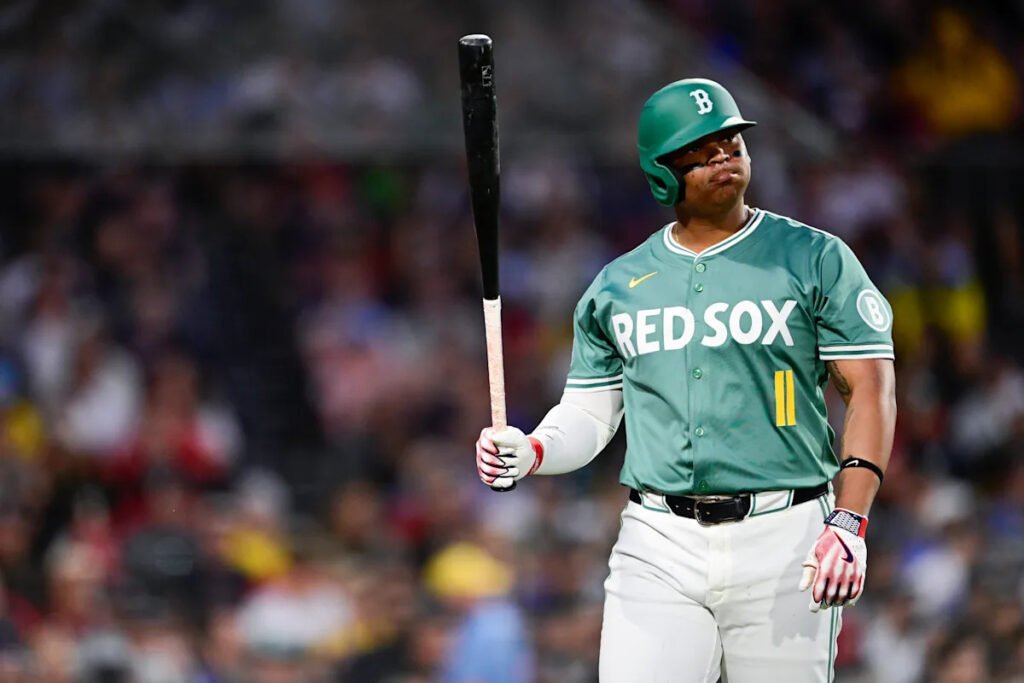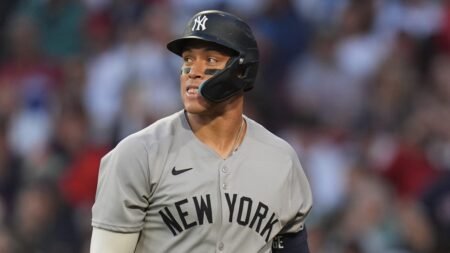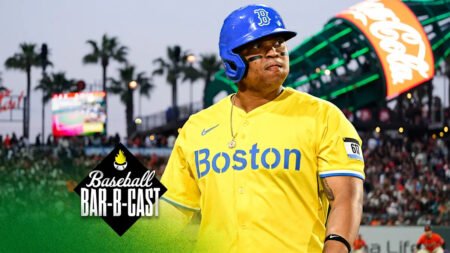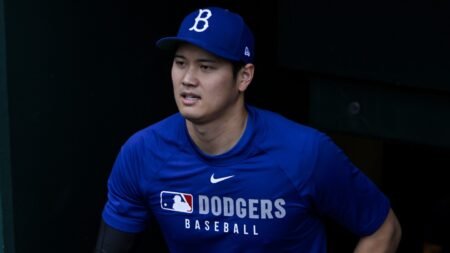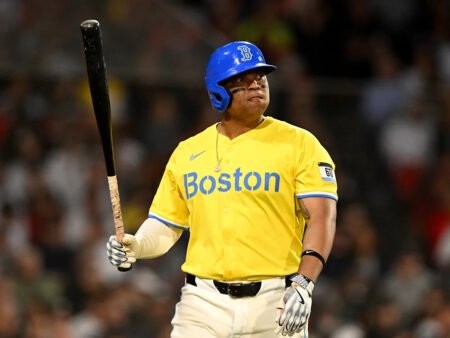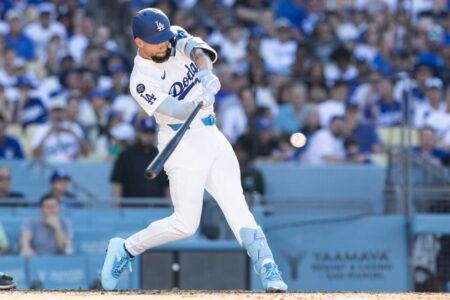The Red Sox shocked the baseball world on Sunday by trading designated hitter and third baseman Rafael Devers to the San Francisco Giants. The trade ends a monthslong saga between the Red Sox and Devers.
The timeline of Devers’ tenure with the Red Sox organization goes back more than a decade to when Boston signed him as an international free agent at the age of 16. He then made his debut in 2017 at age 20, and it wasn’t long before his impact was being felt in Boston.
Advertisement
After the trade of superstar Mookie Betts in 2020 and the departure of Xander Boegaerts in free agency in 2022, the organization looked to Devers to be the new face of the franchise. The Red Sox, led by former top executive Chaim Bloom, inked Devers to a 10-year, $313.5 million extension in December 2022, committing to him for the long term.
But all those warm and fuzzy feelings quickly evaporated this season after Boston acquired third baseman Alex Bregman in free agency and the team told Devers he would be their permanent designated hitter going forward. Devers, who isn’t the best defensive third baseman by any metric, was not shy about voicing his displeasure.
And it didn’t end there. After first baseman Triston Casas was lost for the season after tearing his patellar tendon, the Red Sox asked Devers if he’d be willing to play first base. Having already moved once, he was less than happy about that request and ultimately told the Red Sox no.
Advertisement
That’s how we get to Sunday.
After spring training, neither side fully let things go
The Red Sox’s decision to trade Devers feels like an ugly breakup and the conclusion of an untenable situation that never should’ve become untenable. The lack of communication between the two sides ultimately doomed this marriage. When Boston told Devers in the spring that he’d only DH and would no longer play the field, the team pigeonholed itself with little room to maneuver. Had they split Devers’ time between first base and DH back then, even with a healthy Casas, at the very least they would’ve had a better path to handle this situation. Instead, Devers felt that the team was never upfront about its intentions for him, not only this year but also going into the offseason.
Looking back now, despite all the comments from the Red Sox about moving on after the spring training debacle, it’s clear that neither side fully let all this go. The situation smoldered in the background, and now Devers’ trade to San Francisco is the ugly ending.
Advertisement
The Giants’ new designated hitter ultimately changed positions and, after an adjustment, has looked like the three-time All-Star he has been his entire career. But let’s be clear: Devers never wanted to change positions, and he never stopped feeling that the Red Sox — specifically chief baseball officer Craig Breslow — took his position from him. Therefore, he was unwilling to listen to another request to move to first base.
For Breslow and the Red Sox, it seems that they never forgot that Devers wasn’t willing to change positions after the addition of Bregman, despite their conviction that it would make the team better. And they also didn’t forget that Devers was unwilling to play first after Casas’ season-ending knee surgery.
Sources tell Yahoo Sports that Devers never made a formal request to the Red Sox to be traded. While this doesn’t mean that he wasn’t unhappy or frustrated, he wouldn’t have been the first disgruntled superstar to play professional baseball. Instead, Boston’s decision to trade Devers with the team in great position in the AL wild-card race indicates that they decided they’d be better off without him.
What happens now?
The timing of the trade is a head-scratcher. We’re a month-and-a-half away from the trade deadline, and the Red Sox are not a team clearly looking to sell. Although they’ve struggled to play consistent baseball in 2025, Boston is coming off a sweep of the AL East-leading New York Yankees. They’re finally back over .500 and just a half-game back of the third AL wild card.
Advertisement
Trading the team’s best hitter in the midst of that hardly makes sense. Devers is currently hitting .272 with 15 homers and a team-leading .905 OPS in 72 games this season. Since April 26, he has an OPS close to 1.000 with 13 home runs. Despite that, it’s not hard to believe that Breslow had seen enough. He’s not the executive who gave Devers the $313.5 million deal, and therefore, he had no reason to feel beholden to him or whatever promises were made to the 2018 World Series champion three years ago.
There are other ramifications of this trade for the Red Sox. First, it puts significant pressure on the team’s young core to perform. Boston’s prospect trio of second baseman Kristian Campbell, infielder Marcelo Meyer and No. 1 prospect Roman Anthony are highly touted in the game. But none of those players has produced at the level of Devers, and while the hope for each of them is to become an All-Star-caliber player, Devers already is one.
This move also gives Bregman and his agent, Scott Boras, tons of leverage this offseason. Bregman, currently on the injured list due to a right quad strain, is making $40 million in average annual value in 2025 and has an opt-out at the end of the season. If he chooses to exercise that and go elsewhere, it would put the Red Sox in an extremely precarious position, without a superstar bat in their lineup.
Did both the Red Sox and Devers make mistakes over the past five months? Absolutely. Devers failed to realize the bad optics for him, especially after the Casas injury, despite his being considered a good teammate over the years. He also failed to realize that just because the Bloom regime promised him he’d stay at third, that didn’t mean Breslow and Co. would have the same plan.
Advertisement
But did this situation have to get to this point? No. Ultimately, the Red Sox’s ostracizing and alienating their best player created a rift in the relationship that could never be repaired.
This move will not be easily digestible for a fan base that has already seen a superstar in Betts traded to the Dodgers, and five years later, no player included in that deal is still with the organization. The patience in Boston was already thin, and trading Devers surely will only exacerbate the issue.
As the Red Sox attempt to move forward, Breslow’s legacy in Boston will be judged based on what he does following this megadeal. All eyes will be on him to see if he and the Red Sox can prove that this move was the right one for the franchise’s future.
Read the full article here





